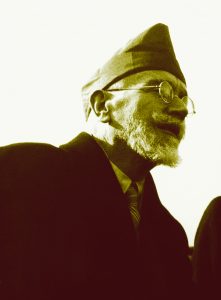28 Jun The myth
 Eleftherios Venizelos has been identified with both the peak of the Great Idea for the Treaty of Sèrves of 1920 and with its final liquidation at the Treaty of Lausanne in 1923. Besides, the dramatic consequences of his decisions, mainly in matters of foreign policy, affected the entire Greek world. Thus, he became the object of quasi-religious worship and of fanatical hatred. Some saw him as the heroic figure that achieved the unachievable vision of the Great Idea and the reconstruction of the State. Others saw him as the principal cause of the discord and the division of the country, whose consequences were felt long after his withdrawal from the public life and his death. But even within the liberal party, which was his own creation, his authority was questioned even by former close associates of his, particularly after 1920. To one such acute confrontation in parliament with his one-time close associate Alexander Papanastasiou Venizelos reacted on the spot by composing his own epigram that would later be carved on his grave at Akrotiri, Hania. It was the obituary Papanastasiou himself would, purportedly, be compelled to deliver at Venizelos’ funeral:
Eleftherios Venizelos has been identified with both the peak of the Great Idea for the Treaty of Sèrves of 1920 and with its final liquidation at the Treaty of Lausanne in 1923. Besides, the dramatic consequences of his decisions, mainly in matters of foreign policy, affected the entire Greek world. Thus, he became the object of quasi-religious worship and of fanatical hatred. Some saw him as the heroic figure that achieved the unachievable vision of the Great Idea and the reconstruction of the State. Others saw him as the principal cause of the discord and the division of the country, whose consequences were felt long after his withdrawal from the public life and his death. But even within the liberal party, which was his own creation, his authority was questioned even by former close associates of his, particularly after 1920. To one such acute confrontation in parliament with his one-time close associate Alexander Papanastasiou Venizelos reacted on the spot by composing his own epigram that would later be carved on his grave at Akrotiri, Hania. It was the obituary Papanastasiou himself would, purportedly, be compelled to deliver at Venizelos’ funeral:
“My dear friends, the dead man lying before us was a real man with great courage and self-assurance for both himself and for the people he had been called on to govern. He may have made many mistakes, but he never lacked courage; he had never been a fatalist because he never depended on his fate to see his country move forward, but he put all the fire he had within him and every mental or physical strength, at its service”.
At a time when reliable news was difficult to obtain and the power of oral speech, as opposed to written speech – and far more in contrast wit live picture- was superior, he is the only one among politicians of modern Greece who has given rise to the creation of legends about his birth and origin: a flash in the sky, the prayer of both a priest and hodja on his birth indicate the belief that Venizelos was sent by God.
His admirers praised him beyond any limit of exaggeration. “His life was an epic one, because his merits too were those of a legendary hero, attracting international admiration”, is a phase written one day after his death.
His opponents saw in his person the enemy of the fatherland, in his decisions, they saw treason and in his boldness, unscrupulous ambition. Nevertheless, even the most spiteful among his enemies acknowledged the magnitude of his personality:
“He was a man who, as of the very first day he came into being until the day he passed away, created History by himself, a history that we, the other Greeks, were invited to live through either as opponents or as comrades” (George A. Vlachos).
Two works identifying Venizelos with the vision of the Great Idea in terms of its expectation and its fulfillment are characteristic samples of the creation of the legend surrounding Venizelos during his life-time: a picture dating from 1916, depicting as a young with the Acropolis of Athens and Santa Sophia of Constantinople in the background, that was a homage of the Society “Ai Mousai” (The Muses) of Kalymnos and a gold wreath he was offered as a gift after the Treaty of Sèrves had been signed in 1920.
Besides, collective memory recorded its admiration for the person of Venizelos in works of art, whether noble or folk art, ranging from paintings and statues to cheap objects of daily use and from popular verses to poetry of high aesthetic value, like the following poem written by Kostis Palamas:
Gone is the Great man. Light up a monument as great he was
That’ll be a star, Athens his light and Crete his way.
His voice deserves be Homer’s verse; mourning is not enough.
His pace is fiery, like a climb to Psiloritis.
His fate was destined to liven and raise
Sacred times’, both ancient and modern, brightness:
Angers ran wild, passions became storms, hatred rose like dark nights;
You’re flickering, oh, evening star, you shive, oh, Greece.
The building of the legend surrounding Venizelos originated and thrived particularly in Crete, the island where he was born, but also among solid groups of people throughout the rest of the country, for instance, among refugees from Asia Minor. It is a phenomenon that reflects the acute confrontation originating, on the one hand, in his enchanting personality and, on the other hand, in the fury with which his opponents fought against him. At any rate, history has evaluated Eleftherios Venizelos as the most important modern Greek politician, above all for his contribution to the fulfillment of the territorial aspirations and to the modernization of Greece.




